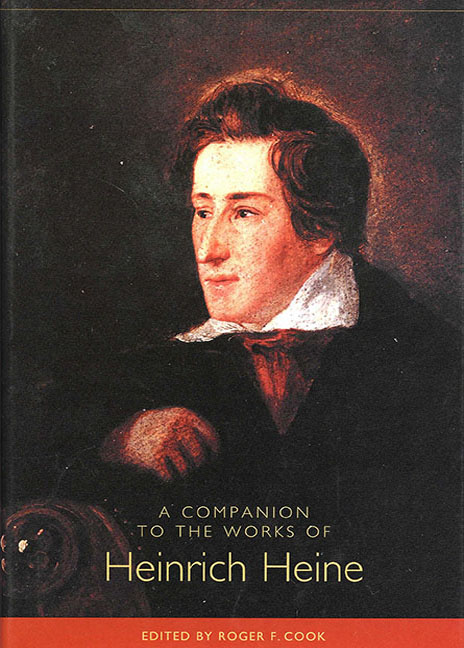Book contents
- Frontmatter
- Contents
- Acknowledgments
- Chronology of Heine's Life
- Heine's Major Works
- List of Abbreviations
- Introduction
- The Romantic Poet
- Illusions Lost and Found: The Experiential World of Heine's Buch der Lieder
- A Walk on the Wild Side: Heine's Eroticism
- The Riddle of Love: Romantic Poetry and Historical Progress
- Philosophy, History, Mythology
- Religion, Assimilation, and Jewish Culture
- Modernity: Views from the Poet's Crypt
- Reception in Germany
- Notes on the Contributors
- Index
Illusions Lost and Found: The Experiential World of Heine's Buch der Lieder
from The Romantic Poet
Published online by Cambridge University Press: 29 July 2017
- Frontmatter
- Contents
- Acknowledgments
- Chronology of Heine's Life
- Heine's Major Works
- List of Abbreviations
- Introduction
- The Romantic Poet
- Illusions Lost and Found: The Experiential World of Heine's Buch der Lieder
- A Walk on the Wild Side: Heine's Eroticism
- The Riddle of Love: Romantic Poetry and Historical Progress
- Philosophy, History, Mythology
- Religion, Assimilation, and Jewish Culture
- Modernity: Views from the Poet's Crypt
- Reception in Germany
- Notes on the Contributors
- Index
Summary
I
The Great Literary-Historical importance of Heine's Buch der Lieder of 1827 is as a document of generational disillusion. It articulates as no other work in German does the combination of disappointment, skepticism, irony, and self-pity that was the prevailing mood of the first post-Romantic generation, those born around 1800 and coming to maturity at the beginning of the 1820s. Such other German-language authors as Mörike, Grillparzer, Immermann, and Nestroy in their different ways also represent this spirit. But Buch der Lieder is its classic document.
In the widest sense what is at issue is the demise of idealism — political, philosophical, emotional, aesthetic. In the German states — and elsewhere — the fifteen years after 1815 seemed politically an insipid and unheroic time. Depending on political allegiance, the grandeur of the previous age might be found in the Napoleonic principle, in national self-affirmation and the resistance to Napoleon, in the striving for bourgeois democracy, or in social revolution; but from all of these points of view the regressive politics of the 1820s were ignoble and prosaic. At the same time, the cultural world of the Classical/Romantic era was collapsing, as its representatives came to look old and foolish and its precepts began to seem irreconcilable with modern reality. Philosophies that held that truth lay within the human mind, of which the world of phenomena was merely an invention, or that the cultivation of the subjective, irrational, unconscious self was the path to fulfillment, lost their credibility; literature that sought its aesthetic and ideological models in a primitive past, or that considered the empirical present the least worthy object of representation, began to seem absurd. Such reactions were themselves a necessary effect of the wider changes taking place in the intellectual and physical world: specifically, the predominance of a materialist outlook, which came with the development of modern empirical science and its industrial exploitation, with the rise to economic power and social dominance of the class of capital, and with the emergence of an urban mass society. The socioeconomic changes may have happened more slowly in the German states than elsewhere, but the shift in outlook — to the sense of what Büchner in the 1830s called a “material age”1 — was profound in Germany, too.
- Type
- Chapter
- Information
- A Companion to the Works of Heinrich Heine , pp. 37 - 54Publisher: Boydell & BrewerPrint publication year: 2002

